|
De Duitse dichteres, schrijfster en caberetiere Emmy Hennings werd geboren op 17 februari 1885 in Flensburg. Zie ook alle tags voor Emmy Hennings op dit blog.
After the Cabaret
I see the early morning sun
At five a.m. I homeward stroll.
The lights still burn in my hotel.
The cabaret is finally done.
In shadows children hunker down.
The farmers bring their goods to town.
You go to church, silent and old
grave sound of church-bells in the air,
and then a girl with untamed hair
wanders up all blear and cold:
“Love me, free of every sin.
Look, I’ve kept watch many nights .”
Untitled
And nighttime when there is no light
and pictures fall right off the walls,
then someone laughs so big and bright
Someone’s long hands grab for me
And then a lady with green hair
who looks at me so very sad --
she was once a mother she swears.
She cannot bear the weight of pain
(I press the thorns into my heart
and then stop full of peace,
and I will suffer every hurt
it’s what is asked of me.)
Vertaald door Howard A. Landman
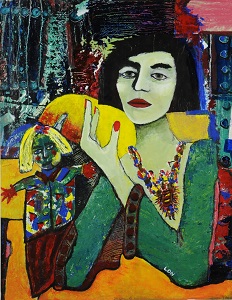
Emmy Hennings (17 februari 1885 – 10 augustus 1948)
Portret door Alexander Graf, 1951
De Japanse schrijver Mori Ōgai werd geboren op 17 februari 1862 als Mori Rintaro in het dorpTsuwano in Iwami. Zie ook alle tags voor Mori Ōgai op dit blog.
Uit: The Dancing Girl (vertaald door Richard Bowring)
„They have finished loading the coal, and the tables here in the second-class saloon stand in silence. Even the bright glare from the electric lights seems wasted, for tonight the group of card players who usually gather here of an evening are staying in a hotel and I am left alone on board. It is now five years since the hopes I cherished for so long were fulfilled and I received orders to go to Europe. When I arrived here in the port of Saigon, I was struck by the strangeness of everything I saw and heard. I wonder how many thousands of words I wrote every day as I jotted down random thoughts in my travel diary. It was published in a newspaper at the time and was highly praised, but now I shudder to think how any sensitive person must have reacted to my childish ideas and my presumptuous rhetoric. I even recorded details of the common flora and fauna, the geology, and the local customs as if they were rarities. Now, on my way home, the notebooks that I bought intending to use for a diary remain untouched. Could it be that while studying in Germany I developed a kind of nil admiral attitude? No, there is another reason. Returning to Japan, I feel a very different person from when I set out. Not only do I still feel dissatisfied with my studies, but I have also learned how sad this transient life can be. I am now aware of the fallibility of human emotions, but in particular I realize what a fickle heart I have myself. To whom could I possibly show a record of fleeting impressions that might well be right one day and wrong the next? Perhaps this is why my diary was never written. No, there is another reason. Twenty days or more have passed since we left Brindisi. Usually it is the custom at sea to while away the cares of travel even in the company of utter strangers, but I have shut myself up in my cabin under the pretext of feeling somewhat indisposed. I seldom speak to my fellow travelers, for I am tormented by a hidden remorse.
At first this pain was a mere wisp of cloud that brushed against my heart, hiding the mountain scenery of Switzerland and dulling my interest in Italy's ancient wins. Then gradually I grew weary of life and weary of myself, and suffered the most heart-rending anguish. Now, remorse has settled in the depths of my heart, the merest shadow. And yet, with everything I read and see it causes me renewed pain, evoking feelings of extreme nostalgia, like a form reflected in a mirror or the echo of a voice. How can I ever rid myself of such remorse? If it were of a different nature I could perhaps soothe my feelings by expressing them in poetry.”
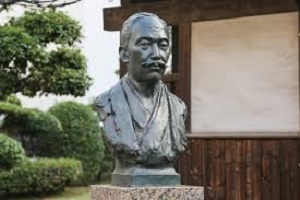
Mori Ōgai (17 februari 1862 – 9 juli 1922)
Borstbeeld in Kokura, Kitakyūshū
De Spaanse dichter Gustavo Adolfo Bécquer werd op 17 februari 1836 in Sevilla geboren. Zie ook alle tags voor Gustavo Adolfo Bécquer op dit blog.
Her hand within my hands
Her hand within my hands,
Her eyes upon my eyes,
Her amorous head
Reclined upon my breast.--
God knows how many times,
With languid step,
We wandered on together
Beneath the high-topped elms,
Which round her portal throw
Shadow and mystery!
And yesterday, scarcely a year
Flown like a breath,
With what a finished grace,
With what a smiling calm,
She said, as an officious friend
Presented each to each--
"I think somewhere we've met,
Your face is known to me"--
Ah! fools and high-born gossips
Who chase athwart the salons
Your prey of scandalous love-tales,
What a prize is lost you here!
How exquisite a morsel
Meant to be devoured
Mid whispers--in corners,
Behind your fans
Of feathers and of gold!--
O! chaste and silent moon,
O! tall and leafy elms,
O! walls which gird her house,
O! shadows of her gate--
Keep silence, let none guess!
Keep silence!--for my part
I have forgotten all,
And she--she--there is no mask
Like to her face!
Vertaald door Mary A. Ward
A Matter Of Semantics
t's a matter of semantics, and yet
After what happened, you and I
Could never agree
Who is at fault.
Too bad there is no lover's dictionary
To define once and for all
When pride is merely pride,
And when it is dignity.
Vertaald door Walter Wykes
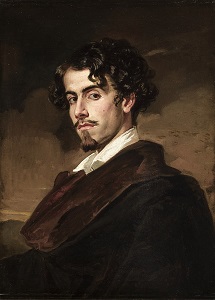
Gustavo Bécquer (17 februari 1836 – 22 december 1870)
Portret door Valeriano Bécquer, 1862
De Duitse dichter en schrijver Georg Britting werd op 17 februari 1891 geboren in Regensburg. Zie ook alle tags voor Georg Britting op dit blog.
Früh im Jahr
Die Äste sind schwarz
Und das Licht ist schmächtig –
Woran erkennst du den
Frühling?
Die Luft ist trächtig,
Trägt Hauch und Gerüche.
Kocht schon in der Küche,
Im felsigen Hohlraum
Die alte Frau Mutter?
Wind sagt seine Sprüche,
Die stößig gekürzten,
Dem Schweigen ins Ohr.
Felsen, was flennst du
Duftende Tränen?
Was soll dein Gähnen,
Sumpfloch im Moor?
Wind, und das nennst du schon
Ahnung und Frühling,
Weil in der Küche,
Im felsigen Tief,
Der Alten, der Mutter
Ein Topf überlief,
Mit Sud vom Gewürzten?
Den März erwartend
Der März bringt den Frühling, den warmen Wind,
Und wenn auch die Fenster gefroren sind,
Bald tauen und tropfen sie alle,
Und wo jetzt der schwärzliche Schnee noch liegt,
Wirds sein, daß sich zitternd im Windhauch biegt
Das Gras in der Buchenwaldhalle.
Dann ist es so weit, und dann kommt der Tag,
An dem auch das Veilchen sich rühren mag,
Im nassen Moose, noch schüchtern.
Das wird wie im trunkenen Rausch nicht sein:
So ist nicht der März, selbst sein Sonnenschein
Ist rauschig nicht, nein, er ist nüchtern.
Und probt dann ein Vogel den ersten Ton,
Staunt über sich selber und fliegt davon,
Erschauert der Himmel, als schäm er
Der prahlenden, hellblauen Farbe sich,
Ganz nackt, wie er glänzt, ohne Wolkenstrich –
Ja, so wird der März sein, o käm er!
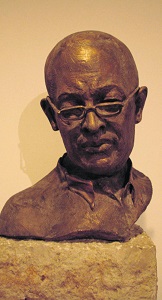
Georg Britting (7 februari 1891- 27 april 1964)
Borstbeeld door Hermann Leber in Regensburg
De Australische dichter Andrew Barton "Banjo" Paterson werd geboren op 17 februari 1864 in Narambla in New South Wales. Zie ook alle tags voor Andrew Paterson op dit blog.
The Man Who Was Away
The widow sought the lawyer's room with children three in tow,
She told the lawyer man her tale in tones of deepest woe.
Said she, 'My husband took to drink for pains in his inside,
'And never drew a sober breath from then until he died.
'He never drew a sober breath, he died without a will,
'And I must sell the bit of land the childer's mouths to fill.
'There's some is grown and gone away, but some is childer yet,
'And times is very bad indeed — a livin's hard to get.
'There's Min and Sis and little Chris, they stops at home with me,
'And Sal has married Greenhide Bill that breaks for Bingeree.
'And Fred is drovin' Conroy's sheep along the Castlereagh,
'And Charley's shearin' down the Bland, and Peter is away.'
The lawyer wrote the details down in ink of legal blue —
'There's Minnie, Susan, Christopher, they stop at home with you;
'There's Sarah, Frederick, and Charles, I'll write to them to-day,
'But what about the other one — the one who is away?
You’ll have to furnish his consent to sell the bit of land.'
The widow shuffled in her seat, 'Oh, don't you understand? '
I thought a lawyer ought to know — I don't know what to say —
'You'll have to do without him, boss, for Peter is away.'
But here the little boy spoke up — said he, 'We thought you knew;
'He's done six months in Goulburn gaol — he's got six more to do.'
Thus in one comprehensive flash he made it dear as day,
The mystery of Peter's life — the man who was away.
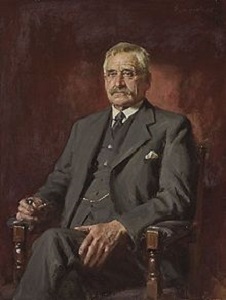
Andrew Paterson (17 februari 1864 – 5 april 1941)
Portret door John Longstaff, 1935
De Amerikaanse schrijfster Margaret Truman werd geboren op 17 februari 1924 in Independence, Missouri. Zie ook alle tags voor Margaret Truman op dit blog.
Uit: The President's House
“In the basement and attic rooms are the memories of the hundreds of other people who lived a large part of their working lives in this unique house, and experienced its aura of power and history. Their stories belong in this book, too. Some, I regret to say, were slaves. But the house, paradoxical as always, gradually became a place where free African-Americans demonstrated their right to equality.
Maggie Rogers began working as a White House maid when William Howard Taft became president in 1909. Her daughter, Lillian Rogers Parks, was hired as a seamstress at the White House in 1929 and worked until the end of the Eisenhower administration in 1961. Growing up, Lillian once asked her mother if she would be happier (and better paid) at some millionaire's mansion elsewhere in the capital. Maggie Rogers scorned the idea. "Heavens no, child! Be it ever so elegant, there's no place like the White House. Why, I'm living history!" There was black pride and White House pride achieving a magical fusion.
Also worth commemorating are the efforts of the dedicated, courageous, amazingly patient men who have struggled to keep presidents and their families alive in the often malevolent glare of public criticism and spasms of national hatred. We know them now as members of the Secret Service. But their predecessors are equally memorable, standing guard at the White House's doors in suits that were a size too large for them--to conceal their pistols. Most people, including some of the presidents they guarded, were unaware of those hidden weapons.
There is a side to these protectors that few people know about, much less appreciate--the many acts of kindness and thoughtfulness they perform for presidents and first ladies. Perhaps the most touching story comes from the sad days of President Woodrow Wilson's decline. Felled by a stroke, he sank into near despair as Congress rejected his dream of world peace embodied in the League of Nations.
When the crippled president went for a ride in the afternoon, the Secret Service used to round up a small crowd of government employees and strolling tourists, who waited at the White House gate to cheer him when he returned. It was a pathetic illusion, but a testament to how much these men cared about the president."
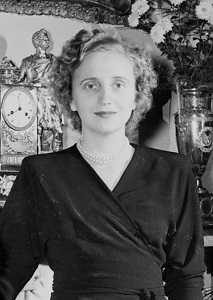
Margaret Truman (17 februari 1924 – 29 januari 2008)
De Britse schrijfster Ruth Rendell werd geboren als Ruth Grasemann in Londen op 17 februari 1930. Zie ook alle tags voor Ruth Rendell op dit blog.
Uit: Harm Done
“On the day Lizzie came back from the dead the police and her family and neighbors had already begun the search for her body. They worked on the open countryside between Kingsmarkham and Myringham, combing the hillsides and beating through the woods. It was April but cold and wet, and a sharp northeast wind was blowing. Their task was not a pleasant one; no one laughed or joked and there was little talking.
Lizzie's stepfather was among the searchers, but her mother was too upset to leave the house. The evening before, the two of them had appeared on television to appeal for Lizzie to come home, for her abductor or attacker, whatever he might be, to release her. Her mother said she was only sixteen, which was already known, and that she had learning difficulties, which was not. Her stepfather was a lot younger than her mother, perhaps ten years, and looked very young. He had long hair and a beard and wore several earrings, all in the same ear. After the television appearance several people phoned Kingsmarkham Police Station and opined that Colin Crowne had murdered his stepdaughter. One said Colin had buried her on the building site down York Street, a quarter of a mile down the road from where the Crownes and Lizzie lived on the Muriel Campden Estate. Another told Detective Sergeant Vine that she had heard Colin Crowne threaten to kill Lizzie "because she was as thick as two planks."
"Those folks as go on telly to talk about their missing kids," said a caller who refused to give her name, "they're always the guilty ones. It's always the dad. I've seen it time and time again. If you don't know that, you've no business being in the police."
Chief Inspector Wexford thought she was dead. Not because of what the anonymous caller said, but because all the evidence pointed that way. Lizzie had no boyfriend, she was not at all precocious, she had a low IQ and was rather slow and timid. Three evenings before, she had gone with some friends on the bus to the cinema in Myringham, but at the end of the film the other two girls had left her to come home alone. They had asked her to come clubbing with them but Lizzie had said her mother would be worried--the friends thought Lizzie herself was worried at the idea--and they left her at the bus stop. It was just before eight-thirty and getting dark. She should have been home in Kingsmarkham by nine-fifteen, but she didn't come home at all. At midnight her mother had phoned the police.”

Ruth Rendell (Londen, 17 februari 1930)
De Russische dichter en schrijver Fjodor Sologoeb (eig. Fjodor Koezmitsj Teternikov) werd geboren in Sint-Petersburg op 17 februari 1863. Zie ook mijn blog van 17 februari 2009 en ook mijn blog van 17 februari 2010.
What Are Our Villages
What are our villages, destitute,
Or the whole of time and of space?
Father's mansions exist in a multitude, -
We don't know their name, and their place.
But, while waiting for joys behind earthly skies,
Beside which life is only a dream,
I renounce the sweetness, beguiling us,
I repulse the distress of time streams.
Cruel torments, decline, degradation,
You have brought me a garland of death.
And the promise of our resurrection
Will be never fulfilled on the earth.
His Wines, Feasts And Funs
His wines, feasts and funs are forgotten,
His sword and his armour are left,
He, single, descends into rotten
A dungeon, without a lamp.
With a shrill and continued sound,
The door - all forgot it - is rolled:
Just dampness and darkness around,
And the window's set high and small.
His eyes grow used to the darkness,
And through humid gloom under vaults,
Strange marks dawn on stony vastness,
Of selling, wet floor, and wet walls.
He looks for a long time at networks
Of the marks, such unknown, and waits,
When his eyes, like eyes of all sinners,
Will be well enlightened by death.
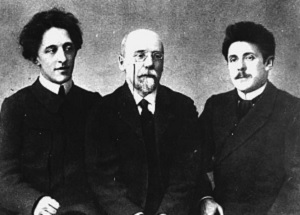
Fjodor Sologoeb (17 februari 1863 - 5 december 1927)
Van links naar rechts: Alexander Blok, Fjodor Sologoeb, Georgy Chulkov, jaren 1910
Zie voor nog meer schrijvers van de 17e februari ook mijn vorige blog van vandaag.
Zie voor bovenstaande schrijvers ook mijn blog van 17 februari 2007 en ook mijn blog van 17 februari 2008 en eveneens mijn blog van 17 februari 2009.
|



